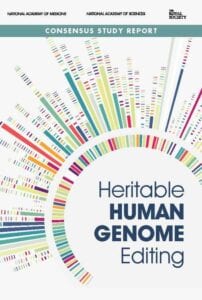By Samata Katta, PhD, Genetics and Public Policy Fellow
 On September 25, ASHG hosted a virtual Forum with several members of the International Commission on the Clinical Use of Human Germline Genome Editing. The Forum was chaired by Charles Rotimi of NIH, and speakers shared findings from the Commission’s final report on Heritable Human Genome Editing (HHGE), which was released earlier that month.
On September 25, ASHG hosted a virtual Forum with several members of the International Commission on the Clinical Use of Human Germline Genome Editing. The Forum was chaired by Charles Rotimi of NIH, and speakers shared findings from the Commission’s final report on Heritable Human Genome Editing (HHGE), which was released earlier that month.
The final report establishes that human germline genome editing technologies are not ready for clinical or therapeutic use in human embryos or reproductive cells. It calls for more stringent criteria for validating the safety and efficacy of genome editing in human embryos and for deciding which initial clinical uses of the technology would be considered most responsible if pre-clinical criteria were met.
The International Commission was created as a joint effort of the US National Academies of Science and Medicine and the Royal Society of the UK to create a process for determining whether, when, and how HHGE should be used, following the 2018 announcement that two babies had been born with CRISPR-edited genomes. (In parallel, the World Health Organization also convened an advisory committee to develop an international oversight framework for future HHGE attempts.) The International Commission focused its own efforts on delineating a responsible pathway for potential translational uses of HHGE. The Commission engaged with ASHG members at the 2019 Annual Meeting to get feedback on its draft report, and the September Forum provided an opportunity for ASHG members to engage with the Commission on the final report.
At the Forum, International Commission co-chair Kay Davies emphasized the new report’s explicit recommendation that no clinical uses should be considered until our ability to make precise genomic changes in human embryos has been clearly established. Co-chair Richard Lifton described the Commission’s scientific criteria for translating pre-clinical genome editing research into technology that could be used for therapeutic purposes. He highlighted issues that would still need to be addressed, such as the lack of reliable technology for editing and for sequencing embryonic DNA to validate edits, and stated that the focus should be on making substitutions rather than on “breaking genes”.
Michèle Ramsay spoke about the Commission’s recommendation to restrict initial clinical applications based on four major criteria: treatment would have to be for a serious monogenic disease, the variant resulting from the edit would have to be common and known not to cause disease, unaffected embryos could not be edited or implanted, and parents would have to have no or very poor options for having a genetically-related child without the disease. She highlighted that with these stringent criteria, international collaboration would be necessary to bring together sufficient data to evaluate the efficacy and outcomes of any potential use.
Bartha Maria Knoppers described the Commission’s recommendations for international governance. Countries should create regulatory bodies to ensure that their decisions would be informed by independent international assessments of the safety and efficacy of HHGE, and to allow case by case evaluation for clinical uses. To assist with that process and advise countries on the risks and benefits of HHGE, we would need an international scientific advisory panel for ongoing evaluation of research, and a diverse international forum to allow debates on potential ethical and societal concerns as well as whether and when new classes of use would be permissible for HHGE. The Commission members closed the Forum by sharing that feedback on this framework had largely been positive, and that they felt they had successfully delineated a responsible translational pathway for HHGE.
If you missed the Forum live, you can watch the recording here.
